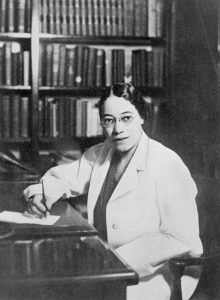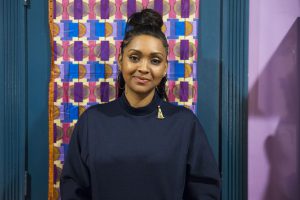In the midst of a global pandemic, doctors have become heroes, putting themselves at risk every day to help those affected. Today, doctors are more important than ever before, but they have been selflessly helping others long before the spread of coronavirus. Doctors have a responsibility to help those in need, and no one exemplifies that better than Dr. Virginia Alexander. In Philadelphia in the 1930s, Alexander ran a clinic from her home where she provided medical services to those who were denied them elsewhere, even if patients could not afford to pay. She used her facility to train future physicians, and her legacy is carried on today by women who share her vision and values.
For most of the nineteenth century, women had difficulty gaining acceptance to medical schools and were often ridiculed by their male counterparts.1 The Woman's Medical College of Pennsylvania, established in 1850,2 provided opportunities for women who could not find an education elsewhere.3 However, as opportunities for white women in the medical field broadened in the late nineteenth century, opportunities for black men and women became increasingly limited.4 Though African Americans could receive medical degrees, both African American doctors and their patients were excluded from white hospitals.5 This exclusion led to the establishment of over two hundred black hospitals in the United States by the 1930s.6 The establishment of more hospitals led to a conflict between black organizations pushing for equality and integration and African American doctors who felt their only opportunities were at black institutions.7 As a black woman physician, Virginia Alexander worked in both black and white hospitals in Philadelphia but conducted her most important work at her private clinic.8, 9
Virginia Alexander was born on February 4, 1900.10 She and her three siblings were raised by her widowed father.11 Though Alexander offered to drop out of school to help support her family, her father refused and instead encouraged all of his children to complete their education.12 After high school, Alexander attended the University of Pennsylvania and the Woman’s Medical College of Pennsylvania (WMCP).13 Following her graduation, she converted part of her small home in Brewerytown into a six-bed clinic called the Aspiranto Health Home (AHH).14 In 1928, she was one of about ninety African American women physicians in the country,12 and according to Philadelphia’s 1930 census, there were over three thousand white doctors in the city and only seven black women physicians.15
Despite her extensive training and education, Virginia Alexander had difficulty finding equal treatment from hospitals. White hospitals would not accept her African American patients, and as a result, she was forced to bring patients she could not treat in her clinic to Mercy-Douglass Hospital, Philadelphia’s black hospital at the time. At the AHH, she provided medical care for pregnant women and young mothers, and gave babies the medical care they needed at the beginning of their lives.11 Though she saw white patients, her focus was on providing quality medical care to African Americans.14 She explained, “…we will have to… above all, give knowledge to Negro women who are going to become mothers”.11 Her practice was a state-licensed facility and a forerunner of modern-day birthing centers.12
“She can never be repaid for the service she has given her race.”

Dr. Alexander in an undated photo (from the Black Women Physicians Project collection Acc178)
At the AHH, Alexander provided impoverished African Americans in Philadelphia with the health care they could not afford to receive elsewhere. To help these women, she did not charge those who could not afford their treatment and often gave her profits back to poor members of her community.16 Alexander also provided contraceptives to women free of charge for two years,17 and at one point, she had over seven thousand dollars in uncollected bills.18 In a letter, she explained, “I have accumulated nothing in the way of the world’s goods; but I think I have established a fairly sound practice”.19 She was described as the “guardian of the health of negro women”,11 and one patient said, “she is one of the most useful women in the community because she can never be repaid for the service she has given her race”.14 Over the course of five years, Alexander saw two thousand patients and delivered forty-three babies, including the granddaughter of W. E. B. Du Bois.16
Alexander’s Aspiranto Health Home not only allowed her to help impoverished members of her community receive much needed medical treatment, but it also paved the way for other young physicians and for her colleague Helen Dickens. Alexander used her clinic to help aspiring doctors start their own practices in Philadelphia. The AHH was a “teaching home,” as she hosted young physicians in her home so they could gain experience at her practice. She hoped her training would enable them to establish their own community-oriented private clinics similar to her own by helping them make connections and learn the needs of their Philadelphia patients.16, 17 Helen Dickens was one such physician who worked closely with Alexander and eventually took over the AHH. After her time at the AHH, Dickens went on to study at the University of Pennsylvania Graduate School of Medicine, becoming the first African American to receive a Master’s of Medical Science degree from the University.10 In 1948 Dickens became the director of the Department of Obstetrics and Gynecology at Mercy Douglass Hospital and was the first African American woman to become a member of the prestigious American College of Surgeons since its inception in 1913.20, 21
“Our relationship is ingrained in our care”
Virginia Alexander spent her life providing medical care to underprivileged members of her community. As a physician, she used her station to aid those less fortunate than she. Through her commitment to equitable public health, Alexander established a clinic to provide her community with the healthcare they were denied elsewhere. She opened the doors of her clinic not only to patients but also to other young physicians, providing them with the experience necessary to eventually open their own clinics. She worked tirelessly and selflessly to help others, not striving to make money or gain recognition.

Asasiya Muhammad at her clinic, Inner Circle Midwifery (photo by Rachel Wisniewski for WHYY)
Today, the WMCP of Virginia Alexander’s day is no longer standing. The University of Pennsylvania hardly resembles the one she attended, and her six-bedroom clinic has long since been renovated. Though little remains today to remind us of her work, Alexander’s legacy is carried on by those who share her commitment to selfless public service. A 2019 story by WHYY reporter Taylor Allen details the work of one such woman. Asasiya Muhammad runs a maternity clinic in Germantown. She is the only black woman in Philadelphia who is a certified professional midwife, and she established Inner Circle Midwifery in 2016. She has always been passionate about reproductive justice, and her goal is to create a safe space for minority women where they can receive care from midwives who relate to their experiences. As an African American woman and a mother of five, she has experienced microaggressions from dismissive doctors at hospitals, and she wanted to provide a different experience for other mothers. She explained, “It feels better being with someone who feels like a mom, an aunt, someone you can relate to. Our relationship is ingrained in our care”.22 Maternity centers such as Muhammad’s are important because minority women are at a much higher risk for birthing complications. In Philadelphia in 2012, African American women made up 74% of maternal deaths, and nationally, black women experience fatal pregnancy complications four times more frequently than white women.23 Like Virginia Alexander, she is using her clinic to help others start their careers as well. Her interns gain experience before going on to pursue careers in women’s health and social justice.22 The women in Muhammad’s clinic are preparing to be the next generation of advocates and doctors like Alexander. Though Alexander’s work is not widely recognized, her legacy is carried on by women such as Muhammad who share her commitment to equitable care for everyone and her dedication to the health of African American mothers.
Read Mikaela Finlay's full paper on Virginia Alexander.
Bibliography
1Abram, Ruth J. “Will There Be a Monument?: Six Pioneer Women Doctors.” “Send Us a Lady Physician”: Women Doctors in America 1835-1920, edited by Ruth J. Abram, W. W. Norton & Company, 1985, pp. 72–75.
2Peitzman, Steven J. A New and Untried Course: Woman’s Medical College and Medical College of Pennsylvania, 1850-1998. Rutgers University Press, 2003, pp. 1, 13, 147-161.
3Hine, Darlene Clark. “Co-Laborers in the Work of the Lord: Nineteenth Century Black Women Physicians.” “Send Us a Lady Physician”: Women Doctors in America 1835-1920, edited by Ruth J. Abram, W. W. Norton & Company, 1985, p. 110.
4Gamble, Vanessa Northington. Making a Place for Ourselves: The Black Hospital Movement, 1920-1945. Oxford University Press, 1995, pp. xvi.
5Byrd, W. Michael, and Linda A. Clayton. “Race, Medicine, and Health Care in the United States: A Historical Survey.” Journal of the National Medical Association, vol. 93, no. 3 [Suppl], Mar. 2001, pp. 11S–34S., www.ncbi.nlm.nih.gov/pmc/articles/PMC2593958/?page=1.
6“Lone Black Hospital in Houston Ailing.” Philadelphia Tribune (1912-2001), 17 Jul. 1990, p. 1. ProQuest, search.proquest.com/docview/533018659?accountid=70954.
7Bousfield, M. O. “AN ACCOUNT OF PHYSICIANS OF COLOR IN THE UNITED STATES.” Bulletin of the History of Medicine, vol. 17, no. 1, 1945, pp. 61–84. JSTOR, www.jstor.org/stable/44440995.
8Rhodes, Bertha. “Personable REALTOR most OUTSTANDING Philadelphia WOMAN: MOST OUTSTANDING WOMAN.” Philadelphia Tribune (1912-2001), 21 Nov. 1935, pp. 5. ProQuest, search.proquest.com/docview/531391582?accountid=70954.
9“Virginia M. Alexander, M.D.” Drexel Medical Archives, Black Women Physicians Project, Virginia Alexander file.
10Alexander, Raymond Pace. “The Doctor Virginia M. Alexander Scholarship Foundation (A Short Summary of the Life of Dr. Alexander)”. The Doctor Virginia M. Alexander Scholarship Foundation, Incorporated, 01 Mar. 1961. Drexel Medical Archives, Black Women Physicians Project, Virginia Alexander file.
11“Virginia M. Alexander”. Drexel Medical Archives, Black Women Physicians Project, Virginia Alexander file.
12Alexander-Minter, Rae. 14 Mar. 1986. Drexel Medical Archives, Black Women Physicians Project, Virginia Alexander file.
13Medical Woman’s Journal, Jul. 1949, pp. 34-35. Drexel Medical Archives, Black Women Physicians Project, Virginia Alexander file.
14Southern Workman, vol. 62, no. 8, 1933, pp. 340–341. Drexel Medical Archives, Black Women Physicians Project, Virginia Alexander file.
15Alexander, Virginia M. The Social, Economic and Health Problems of North Philadelphia Negroes and Their Relation to a Proposed Interracial Public Health Demonstration Center. 1935. University of Pennsylvania Archives and Records Center, Virginia Alexander Papers.
16“Can a Colored Woman be a Physician?” The Crisis, Vol 40, No 2, Feb. 1933, pp. 33-34.
17Alexander, Virginia M. Received by Helen Dickens, 2104 Jefferson Street, 1935, Philadelphia, Pennsylvania. University of Pennsylvania Archives and Records Center, Virginia Alexander Papers.
18Baker, Joseph V. “Dr. Alexander’s Work in Public Health Hailed.” p. 24. University of Pennsylvania Archives and Records Center, Virginia Alexander Papers.
19Alexander, Virginia M. Received by Helen Dickens, 2104 Jefferson Street, 30 Apr. 1935, Philadelphia, Pennsylvania. University of Pennsylvania Archives and Records Center, Virginia Alexander Papers.
20“Changing the Face of Medicine | Helen Octavia Dickens” U.S. National Library of Medicine, National Institutes of Health, 3 June 2015, cfmedicine.nlm.nih.gov/physicians/biography_82.html.
21“History of the American College of Surgeons.” American College of Surgeons, 2020, www.facs.org/about-acs/archives/acshistory.
22Allen, Taylor. “One of the Few Black Midwives in Philadelphia Wants to Give Women of Color More Healthcare Options.” WHYY, WHYY, 13 Feb. 2019, whyy.org/articles/inner-circle-midwifery-wants-more-natural-births-for-women-of-color/.
23Scott, Emily. “Midwives Hope Philly’s First Free-Standing Birth Center Will Make Inclusive Care More Accessible.” WHYY, WHYY, 17 June 2019, whyy.org/articles/midwives-hope-phillys-first-free-standing-birth-center-will-make-inclusive-care-more-accessible/.